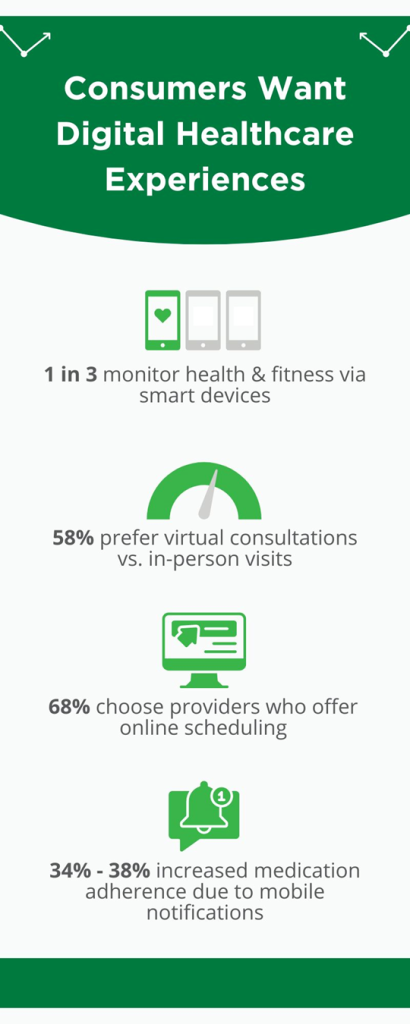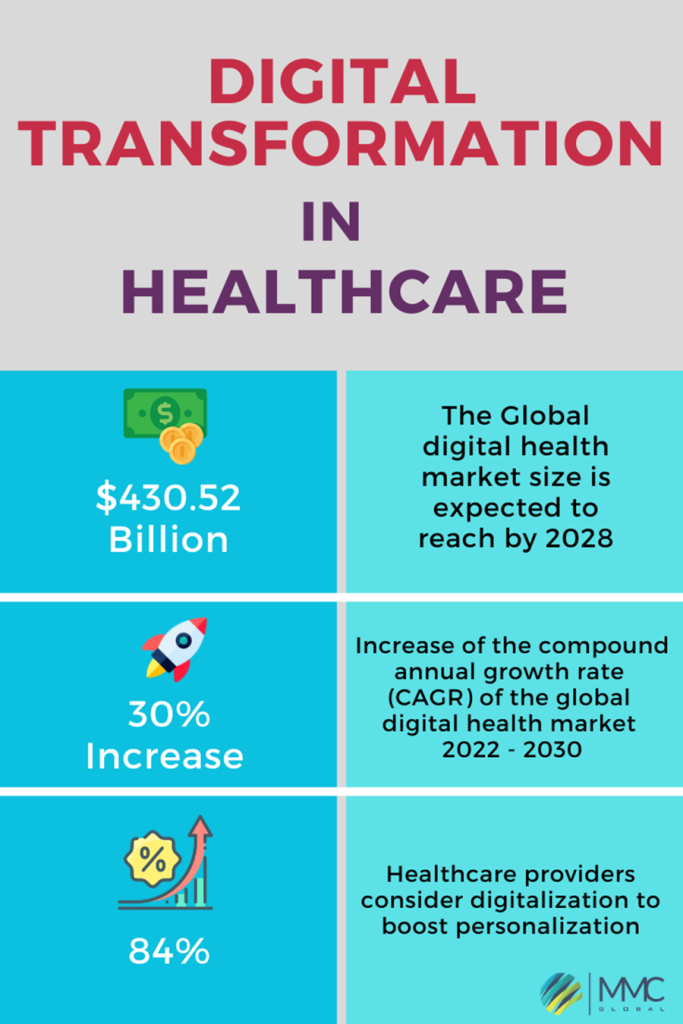
As technology advances, it has become crucial for healthcare providers to adopt a digital transformation strategy and provide the best possible care for their patients. Digital transformation solutions in healthcare have been a game-changer for hospitals and institutions. From telemedicine to artificial intelligence, healthcare is no longer limited by location or lack of insight. Here are five ways that digital transformation can improve patient care.

Leveraging Digital Transformation Strategy to Enhance Patient Care
Healthcare providers can leverage digital transformation solutions to enhance patient care in several ways. With wearable technology, remote monitoring of vital statistics is now possible. This enables doctors to track their patient’s health in real-time and immediately provide treatment. Electronic Health Records (EHR) can also ensure that patient information can be easily accessible to all healthcare providers, enabling faster and more accurate diagnoses.
1) Digital Business Transformation Technology – Wearable Technology
Wearable technology has revolutionized the healthcare industry. Patients can now wear devices that monitor their vital statistics, such as heart rate, blood pressure, and oxygen levels. This data is then transmitted to healthcare providers in real time, allowing for immediate intervention if necessary. Wearable technology can also help patients to manage chronic conditions, such as diabetes, by tracking their blood sugar levels in real-time and reminding them to take their medication.

Becoming More Agile through Digital Transformation Services
Electronic Health Records (EHRs) are another technological advancement that greatly improves patient care. With digital transformation services, healthcare providers can access a patient’s medical history, medications, and test results anywhere. This means doctors can make more informed decisions about a patient’s care and avoid potentially harmful drug interactions. Digital transformation services like EHRs allow for better communication between healthcare providers, as they can easily share information and collaborate on treatment plans.

Adopting Digital Transformation Strategy for Healthcare Institutions
In addition to wearable technology and EHRs, many other technological tools can enhance patient care. Telemedicine, for example, allows doctors to consult with patients quicker and remotely, thus reducing the need for in-person visits and making healthcare more accessible. Mobile apps can also help patients manage their health by providing reminders to take medication, tracking symptoms, and offering educational resources.
Seamless Integration of Healthcare Services through Digital Transformation Solutions
As technology advances, the possibilities for enhancing patient care are endless. From virtual reality therapy to artificial intelligence diagnosis, the future of healthcare is exciting and full of potential through digital transformation solutions like custom app development.

2) Utilizing Artificial Intelligence to Gather Insights
Artificial intelligence can also be one example of a digital transformation strategy. It revolutionizes the healthcare industry by providing doctors with tools to gather previously impossible insights. By leveraging AI algorithms, doctors can now analyze vast amounts of patient data, including medical history, genetic information, and lifestyle factors, to detect patterns and make predictions.

Using Digital Transformation Services to Make Healthcare More Accessible
One area where AI is making a significant impact is in the early detection of diseases. For example, AI algorithms can analyze medical images, such as X-rays and MRIs, to detect signs of cancer or other illnesses that may be difficult for human doctors to spot. This can lead to earlier diagnosis and treatment, improving patient outcomes and saving lives.
Personalizing Healthcare through Digital Transformation Solutions
Moreover, AI can help doctors personalize treatments for individual patients. By analyzing patient data, AI algorithms can identify which treatments will likely be most effective for specific patients based on genetics and medical history. This can also lead to more targeted, advanced, and effective treatments, reducing the risk of side effects and improving patient outcomes.
Digital Transformation Strategy – Using AI to Gather Insights
Another area where AI is used to gather insights is drug discovery. AI algorithms can analyze clinical trials and scientific research data to identify potential new drug candidates. This can enhance drug discovery and lead to more advanced treatments for previously untreatable diseases.
Using AI to Enhance Healthcare Services
AI is a powerful tool for doctors to gather insights and improve patient care. By leveraging AI algorithms, doctors can analyze vast amounts of data to detect patterns and make previously impossible predictions. This can lead to earlier diagnosis, more personalized treatments, and the development of new therapies for previously untreatable diseases.
3) Harnessing Data to Provide Better Care
Healthcare providers are constantly striving to improve patient care. One way to achieve this is by harnessing the power of medical data. Healthcare providers can gain knowledge and insights for analyzing patient health data. This information can further be used to provide more personalized treatment plans tailored to each patient’s unique needs.
Predictive Analysis
Predictive analytics can be used to determine patient risk factors. By analyzing large amounts of data, healthcare providers can now identify patients at risk of developing certain conditions or experiencing certain health outcomes. This information can be used to design medical interventions to help prevent these outcomes.
Using Analytics as a Digital Transformation Strategy for Healthcare
Analytics can also be used to track patient outcomes. By monitoring patient progress over time, providers can identify areas to improve. For example, if a particular treatment is not producing the desired results, providers can use data to identify alternative treatments that may be more effective.
Importance of Digital Transformation in Healthcare
Another important use of data in healthcare is to gather patient feedback. By collecting patient feedback, providers can gain valuable insights into the patient experience. This information can be used to identify areas where improvements can be made to enhance the patient experience and improve overall satisfaction.
Importance of Patient Medical Data
Overall, the use of data in healthcare is becoming increasingly important. By harnessing the power of data, providers can design more effective care plans, track patient outcomes, and improve the patient experience. As technology advances, the potential for data to transform healthcare is limitless.
4) Streamlining Processes and Increasing Efficiency
Digital transformation in healthcare has revolutionized the way healthcare providers work. With the advent of automated processes and robots, filling prescriptions and delivering supplies have become more streamlined and efficient. This has saved time and ensured consistency in the quality of care provided.
Adopting Digital Transformation Solutions to Enhance Healthcare
Robots have also made it possible to perform complex surgeries with greater precision and accuracy. For instance, robots can perform minimally invasive surgeries, reducing the risk of complications and minimizing patient recovery time.
Digital Healthcare Records
Furthermore, the increase in digital records and automation of processes has reduced administrative tasks for healthcare providers. They can focus more on patient care, treatment and less on paperwork or other administrative tasks. This has resulted in improved patient outcomes and reduced wait times for treatment.
Creating a Coherent Digital Transformation Strategy
Another benefit of digital transformation in healthcare is the ability to provide remote care to patients. This is particularly useful for patients who live in remote areas or have limited mobility. With telemedicine, healthcare providers can consult with patients remotely and provide them the care they need without traveling to a healthcare facility.
Dynamics of Digital Transformation Services for Healthcare
Digital transformation in healthcare has significantly changed how healthcare providers work. It has streamlined processes, increased efficiency, and improved patient outcomes. As digital transformation services technology advances, we can expect to see even more innovative digital transformation solutions to enhance patient care quality.
5) Creating a Seamless Experience with Automation
Patient experience and feedback are critical aspects of healthcare, and digital automation can greatly enhance it. Patients expect quick and easy access to healthcare services in today’s fast-paced world. Automation can help meet these expectations by scheduling around-the-clock appointments and answering common questions through chatbots.
Using Chatbots to Simulate Conversations in Healthcare
Chatbots are now becoming increasingly important in simulating human conversations in healthcare. Patients can interact with chatbots to schedule appointments, ask health-related questions, and receive immediate answers. This saves patients time and reduces healthcare providers’ workload, thus allowing them to focus on more complex medical treatment.
Digital Kiosks and Check-Ins – Digital Transformation Strategy in Healthcare
Digitized check-ins are another way automation can improve the patient experience. Patients can check in for appointments using smartphones or tablets, eliminating the need for paper forms and reducing wait times. This can also save time and reduce the risk of infection transmission, which is especially important during the COVID-19 pandemic.
Automating Manual Processes
Telemedicine appointments and remote consultations are also becoming more common in healthcare. Patients can now consult with their healthcare providers from their homes, eliminating the need to take time off work or travel miles to meet doctors. This is especially beneficial for patients who live in rural areas or have mobility issues.
Digital Transformation Solutions – Creating a Seamless Experience for Healthcare
With automation, patients can have a more seamless experience, improving patient satisfaction and outcomes. Patients can easily receive timely and appropriate care by streamlining processes and reducing wait times. This can result in better health outcomes and improved patient satisfaction.
Empowering Patients with Insight and Education
As the healthcare industry evolves, digital transformation solutions in healthcare can become a key driver in improving patient outcomes and experiences. With technology, patients can now access an abundance of information that can help them better understand their healthcare needs and make informed decisions about their care.

Looking at Digital Transformation Solutions in Healthcare as a Blessing
Undoubtedly, digital transformation solutions in healthcare give patients access to their medical records and treatment plans. This access allows patients to take a more active role in their healthcare decisions and better understand the reasoning behind the treatments they receive. By clearly understanding their medical history, patients can also help their providers make more informed decisions about their care.
Enhancing Access to Medical Records
In addition to providing patients with access to their medical records, digital transformation can help educate patients on their health data. By giving patients easy-to-understand explanations of their lab results, for example, patients can better understand their overall health and make lifestyle changes to improve their well-being.
Treatment Plan Options
Another way that digital transformation can empower patients is by providing them with information about treatment options. With access to information about the benefits and risks of different treatments, patients can make more informed decisions about their care and work with their providers to develop treatment plans best suited to their needs and preferences.
Revolutionizing Healthcare through Digital Transformation Services
Overall, digital transformation in healthcare can revolutionize how patients engage with their healthcare providers and take control of their health and well-being. By providing patients with access to their medical records, educating them on their health data, and empowering them to make informed decisions about their care, digital transformation can help improve patient outcomes and experiences, ultimately leading to a healthier population.

Exploring Telemedicine and Remote Care
As technology has developed, healthcare providers are exploring telemedicine, providing remote care access to patients who otherwise would have difficulty obtaining treatment. Telemedicine enhances remote consultations. Doctors can diagnose patients remotely through video consultations and prescribe medication as needed. Remote care is a game-changer for chronic diseases and those who live far from healthcare services. Telemedicine provides a much-needed lifeline to individuals in need.
Conclusion
As digital transformation revolutionizes healthcare, providers can improve patient care by utilizing this technology. By leveraging AI, harnessing data, streamlining processes, creating a seamless experience, empowering patients with insight, and exploring telemedicine, patients can receive the quality care they deserve. Care providers have the opportunity to enhance patient experience while improving care delivery processes and ultimately leading to better clinical outcomes.



